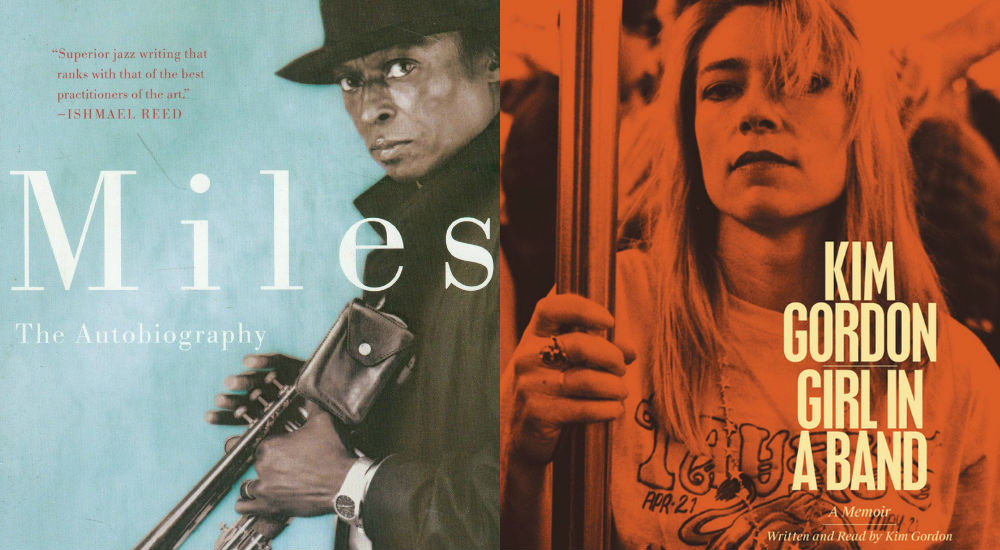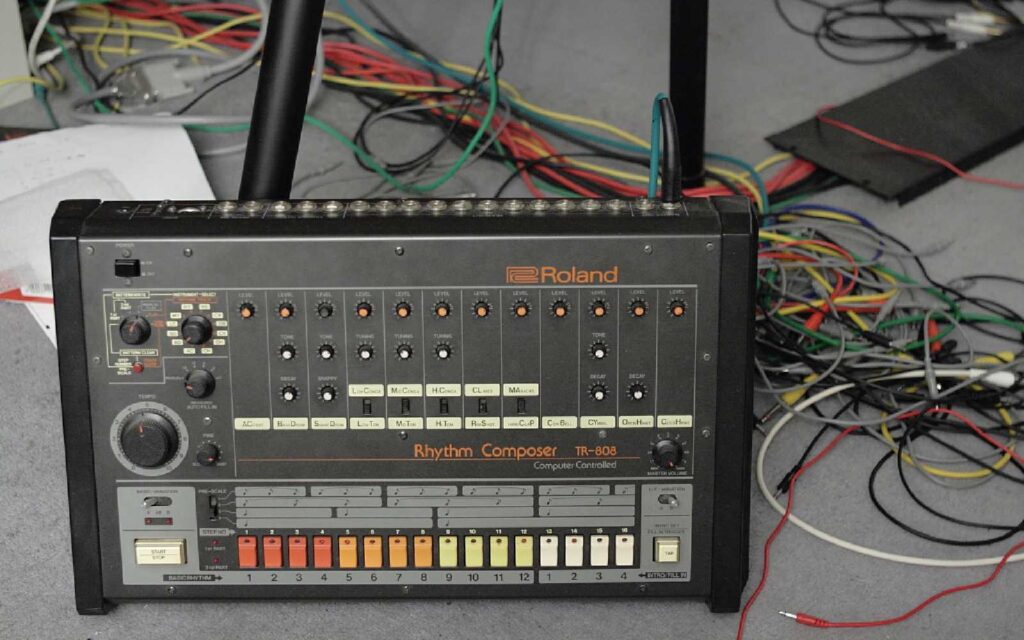Dive head on into these musical page-turners.
It should come to no surprise that the music industry’s a pretty dark and shady place. Many musicians face their own struggles that are often exacerbated by the stresses that come with working in creative industries, and in some cases, it’s amazing that many have even made it to where they are considering all they’ve been through.
Today, we’re checking out nine famous memoirs that deliver a memorable depiction of the darker, seedier aspects of what it’s like to be a professional musician.
Read more features, columns and listicles here.
Meet Me In The Bathroom – Lizzy Goodman
An essential read for any tried-and-true indie fan, Meet Me In The Bathroom is a comprehensive oral recount of New York’s indie rock scene and its boom in the 2000s, with Lizzy Goodman conducting over 200 interviews across six years in order to complete the book.
The book really starts to kick off when it turns its focus to The Strokes and their astronomic rise to international recognition around the release of Is This It, with other accounts from New York groups such The Yeah Yeah Yeahs, Interpol, LCD Soundsystem and Vampire Weekend and non-NY bands like The White Stripes, The Killers and Kings Of Leon soon following.
A vivid, sleazy and brutally honest depiction of the indie scene’s last hurrah before the arrival of social media, Meet Me In The Bathroom certainly doesn’t pull any punches – for every hilarious story about an ecstasy-fuelled orgy between Kate Moss and Kings Of Leon, there’s a heartbreaking anecdote about messy friendships, corporate greed and tragic events, with one particularly saddening moment being when a despondent Albert Hammond Jr. blames his own drug habits for derailing the success of The Strokes.
Definitely one of the best music reads to have come out in recent years.
Just Kids – Patti Smith
Patti Smith’s literary prowess is truly unparalleled, and she’s written plenty of good books to prove so, but nothing can compare with the sheer experience of Just Kids.
A wonderful memoir that seamlessly combines prose, sensationalised reality and lived experiences, Just Kids follows Smith’s relationship with controversial photographer Robert Mapplethorpe as the pair navigated their way through life in New York in the late ‘60s and ‘70s as a pair of young bohemians, enamoured in the experiences offered by the Big Apple during the peak of its status as a cultural hub.
While not as typically gritty as many of the other reads on this list, Just Kids certainly isn’t lacking in emotional potency, with Smith extensively detailing the duo’s relationship as well as the impact of the deaths of her idols and contemporaries like Jimi Hendrix, Janis Joplin and Jim Morrison.
The book concludes with Smith and Mapplethorpe’s final conversations before he died of AIDS in 1989, providing a tear-jerking end to what should be an essential read for any keen creative.
Scar Tissue – Anthony Kiedis
Anthony Kiedis’s 2004 autobiography Scar Tissue is so much more than just another rock star recount of their band’s pathway to fame.
The book traces the Chili Peppers frontman’s wild childhood spent with his father, a prominent playboy in the Sunset Strip club scene of the ‘70s, as well as his own drugged-up teenage years, his friendship with his Red Hot Chili Peppers bandmates, the many women that circled in and out of his life and more.
However, the book is probably best known for documenting Kiedis’s struggles with drug addiction and the many friends and collaborators of the band who shared similar struggles along the way, namely that of Hillel Slovak and John Frusciante.
There’s no shortage of bleak moments, of course, but Scar Tissue also acts as a triumphant account of a band who rose to superstardom against all odds, and holds up as one of the most colourful, engrossing music reads of its kind.
Miles – Miles Davis
Despite his stylistic leanings in jazz, Miles Davis was undeniably one of the baddest, most enigmatic musicians of all time, and it’s arguable that his tempestuous nature and luxurious tastes cut the blueprint for the rockstars that would tread a similar path to success in the ‘70s and ‘80s.
His immersive autobiography, released only two years before he passed away in 1991, is a tell-all account of his rise into New York’s bebop scene in the 1940s and the numerous twists and turns his career took afterwards, revealing the extent of Miles’ turbulent struggles with fame, addiction, racism and family.
At times, Miles makes for quite a harrowing read – the accounts of his drug habits are rather full on, and his treatment of his family and spouses is quite frankly despicable – but all in all, it makes for a captivating tale of one of the most troubled icons of jazz.
The Heroin Diaries – Nikki Sixx
It’s not a well-kept secret that Motley Crüe were pretty hard on the gear in their heyday – the band have always been transparent about their hedonistic behaviour, and their antics have long been the source of fascination with fans, publishers and film studios alike.
However, the extent of the band’s drug abuse were broadcast even further into the world with the release of bassist Nikki Sixx’s eye-popping book The Heroin Diaries, which compiled the his journal entries between the 1986 and 1987 between the recording of Girls Girls Girls and its subsequent tour.
As you’d expect, The Heroin Diaries primarily delves into Sixx and his bandmates struggles with smack and the depression and trauma that ensued, with the book ending with Sixx’s own drug overdose and near-death from injecting heroin.
While there’s a few light-hearted anecdotes about touring and partying thrown in for good measure, The Heroin Diaries shouldn’t be considered a joyous read by any stretch, but it’s fully engrossing nonetheless.
Slash – Slash
In a vein similar to Nikki Sixx’s and Anthony Kiedis’s own autobiographies, Slash sees the top-hatted Guns N’ Roses guitar icon deliver a no-holds barred retelling of his band’s rise to fame in the sleazy, leather-clad Sunset Strip hard rock scene of the ‘80s.
Like any good rock biography, Slash is jam-packed with all the chemical-fuelled hedonism, groupie drama and gigging anecdotes one should ever hope to find, yet what it’s most revered for is its fly-on-the-wall style insight to the dissolution of Guns N’ Roses at the height of their fame.
It’s these moments that tend to be the highlights of Slash’s read, which is more or less just a 480 page confirmation that Axl Rose is one of the biggest Prima Donas in rock ’n roll.
Whether it’s his simple failure to show up to rehearsals on time or the drama that ensued when Axl aimed to take the band in a more synth heavy direction, Slash is a wonderful depiction of what it’s like to be in one of the hardest rocking, hardest partying bands to have survived the ‘80s.
The Haçienda: How Not to Run a Club – Peter Hook
Former Joy Division and New Order bassist Peter Hook is well known for having a bit of a loud mouth, and has written a number of books that trace his time spent with both groups and his overwhelming dislike for bandmate Bernard Sumners.
His best book, however, has got to be The Haçienda: How Not to Run a Club, which details the history of Manchester’s seminal Haçienda nightclub, ran by New Order’s record label Factory Records and co-owned by Hook during its ‘80s heyday.
If you know anything about electronic music in the 1980s, you’ll be aware that the Haçienda was one of the most vital venues in Britain’s acid house boom.
It’s this movement that Hooky discusses in great detail, sharing anecdotes about spaced-out ravers, dodgy club promoters and the misadventures of figures like Shaun Ryder and Tony Williams and how they fostered a movement that’d shape electronic music forever.
There’s also plenty of tales of shady corporate deals, the influence of dodgy cops and gang members, the ramshackle setup of Factory Records and, of course, Hooky’s incessant ego stroking. A sleeper classic for any wannabe raver.
Life – Keith Richards
Written with veteran music journalist James Fox, Life delivers an unparalleled insight into the life and times of the legendary Keith Richards, a man whose chemical tolerance has been the source of endless fascination for us mere mortals for nearly six decades now.
Unlike some other veteran rock reads, Life sticks out like a sore thumb due to Richards’ unique outlook on fame and his reluctant role as an icon, made all the more engrossing by Keith’s surprising talent as a storyteller.
Throughout Life, one gets the impression that Keith isn’t all too enamoured in his life as a superstar with the Stones, with the guitar slinger admitting that his drug habits first arose as a response to his unlikely rise to stardom.
He also discusses the disappointment of meeting his idol, Chuck Berry, as well as his frayed relationship with Mick Jagger, his tendency to sleep with a gun under his pillow during the throes of his addiction, his efforts to live a normal life despite being a walking headline, and so much more.
It’s an addictive read that really skates on a razorblade the whole way through, and I can guarantee you’ll never think of Richards in the same light once you’re done.
Girl In A Band – Kim Gordon
Kim Gordon’s quite possibly one of the most iconic female figures in alternative music, yet that’s never who she really wanted to be.
As the singer and bassist for New York alternative titans Sonic Youth, Gordon was constantly pigeonholed by the press as being a ‘girl in a band’ when all she wanted to be was just another member of a band, coining a rather dismissive phrase that she’d flip on its head to form the title of her revealing 2015 memoir.
Girl In A Band covers everything you’d ever want from a memoir of this nature – Gordon details life in hip ‘80s New York and her unlikely status as a grunge icon in the ‘90s, as well as all the colourful characters and experiences along the way.
However, if there was to be any singular gobsmacking moment in this book, it’d have to be Gordon’s gut-wrenching recount of her marriage to Sonic Youth guitarist Thurston Moore, and her discovery of the secret affair he was having that ended their 27 year marriage and Sonic Youth altogether.
It’s a painfully honest look into an incredibly personal relationship breakdown, and ends Girl In A Band in a spectacular fashion.
Read up on our favourite Australian music documentaries here.







